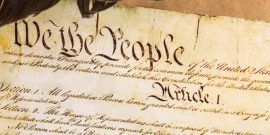The Constitution's Design for Promoting Civic Virtue: Part I
At the Federalist Society Convention I had a debate with my friend, Professor Robert George, on a famous quote by John Adams: “Our Constitution was made only for a moral and religious people. It is wholly inadequate to the government of any other.” In the next three posts, I will excerpt my speech. And then I will add a postscript on Washington’s Farewell Address. Here is the beginning:
John Adams famously said “Constitution was made only for a moral and religious people. It is wholly inadequate to the government of any other.” His claim assumes that we can afford to have the limited government created by the Constitution because the people are already possessed of an abundance of virtue—indeed crucially virtues fortified by religion. But the Constitution itself reflects a very different faith: that a people blessed with a constitution like our own are likely to develop the virtues of self-restraint and social trust needed in order to thrive.
Religion can certainly help actualize virtues but so can other kinds of culture and practices. And the Constitution is premised on the enlightenment view that its very design can create the necessary virtues for civic life from elements of human nature, including raw self-interest. The constitutional structure thus maintains itself and does not necessarily depend on any religious system.
Nothing in the text of the Constitution assumes any level of religious belief on the part of the American people. The Constitution emphatically does not call for the people to adhere to any particular religion or any religion at all. It prohibits all religious tests for any federal office and permits Presidents to affirm rather than take a religious oath to defend the Constitution.
Rather than rely on religion or indeed some thick conception of secular, communitarian virtue, like Sparta, the Framers built the Constitution on the bedrock of human nature. As Hamilton said “man will only serve the public interest, if the structure of government interests his passions in doing so.” Paradoxical as it might seem, Hamilton’s view reflects an important element of Protestant theology at the time which emphasized that politics had to recognize the consequences of the fallen nature of man. Given the unknowability of who actually was among the elect, even many religious believers would have acknowledged it perilous to make the Constitution depend on the uncertain religious state of the populace.
Instead of relying on religion, the Constitution has a different design to elicit the virtues needed for civic life and its preservation. First, the Constitution creates a commercial republic to make sure the self-interest of man helps promote virtue. It is remarkable that except for national defense, almost all the enumerated powers of the federal government were meant to facilitate a continental market—to make commerce regular.
There were far-reaching implications to the essentially commercial character of American society. It put a premium on self-control and honesty; it required citizens to pass judgment informally on one another’s reliability and integrity, since many decisions would be based on reputation; and it required the free exchange of information and ideas so that opportunities could become known. Thus, commerce rewards virtues of self-restraint, fair judgment and social interchange that are indispensable to republican life.
Creation of a commercial society generates an ethos that reaches beyond merchants, influencing the orientation of everything from education to law. In a society devoted to commerce education naturally focuses on self-reliance, not self-indulgence. Political correctness is in tension with the truth seeking of the scientific methods so important to innovation.
Perhaps importantly, commercial society affects the nature of lawyering. In a commercial society lawyers’ bread and butter was private law, and by and large at the Founding the bar stood for the sanctity of contacts and property and the formal reading of legal texts that preserved them. Lawyers were spiritually as well as often literally the brothers of merchants. That is sociological reason that the Framers entrusted the legal community through the judiciary with the power of judicial review.
But after the New Deal created a substantially bureaucratic culture, lawyers’ interests turned to manipulating the bureaucracy. Most lawyers turned against vested rights. They understand law instead as a malleable tool for constitutional transformation, not least because they get a slice of the transactions costs of the bureaucratic state and from each stage of legal change.


